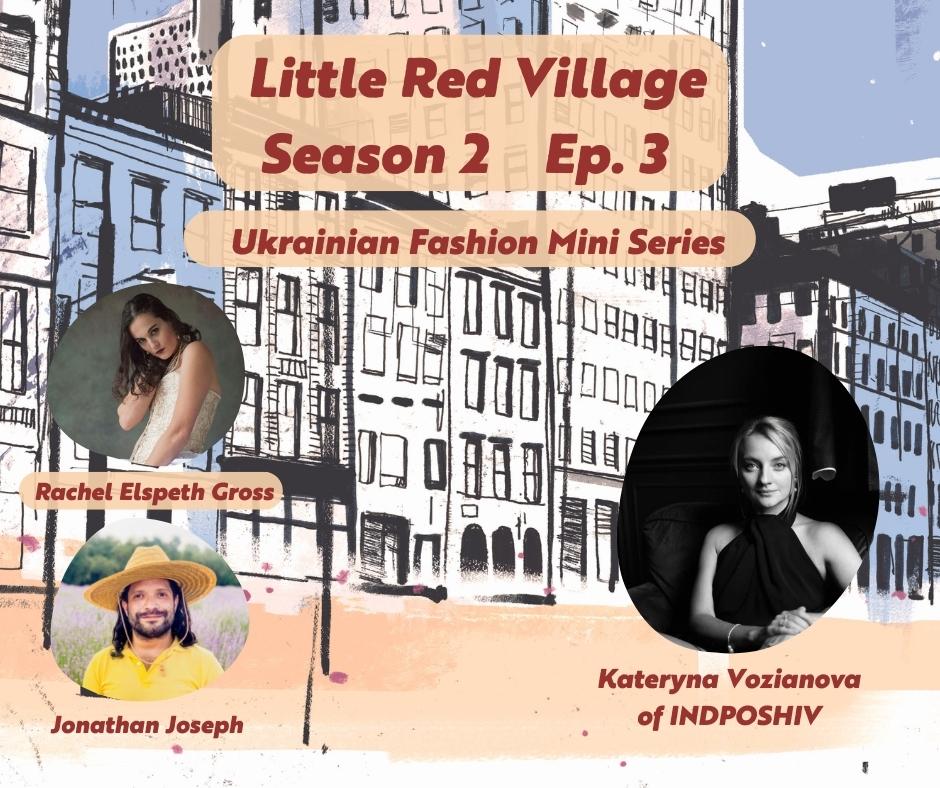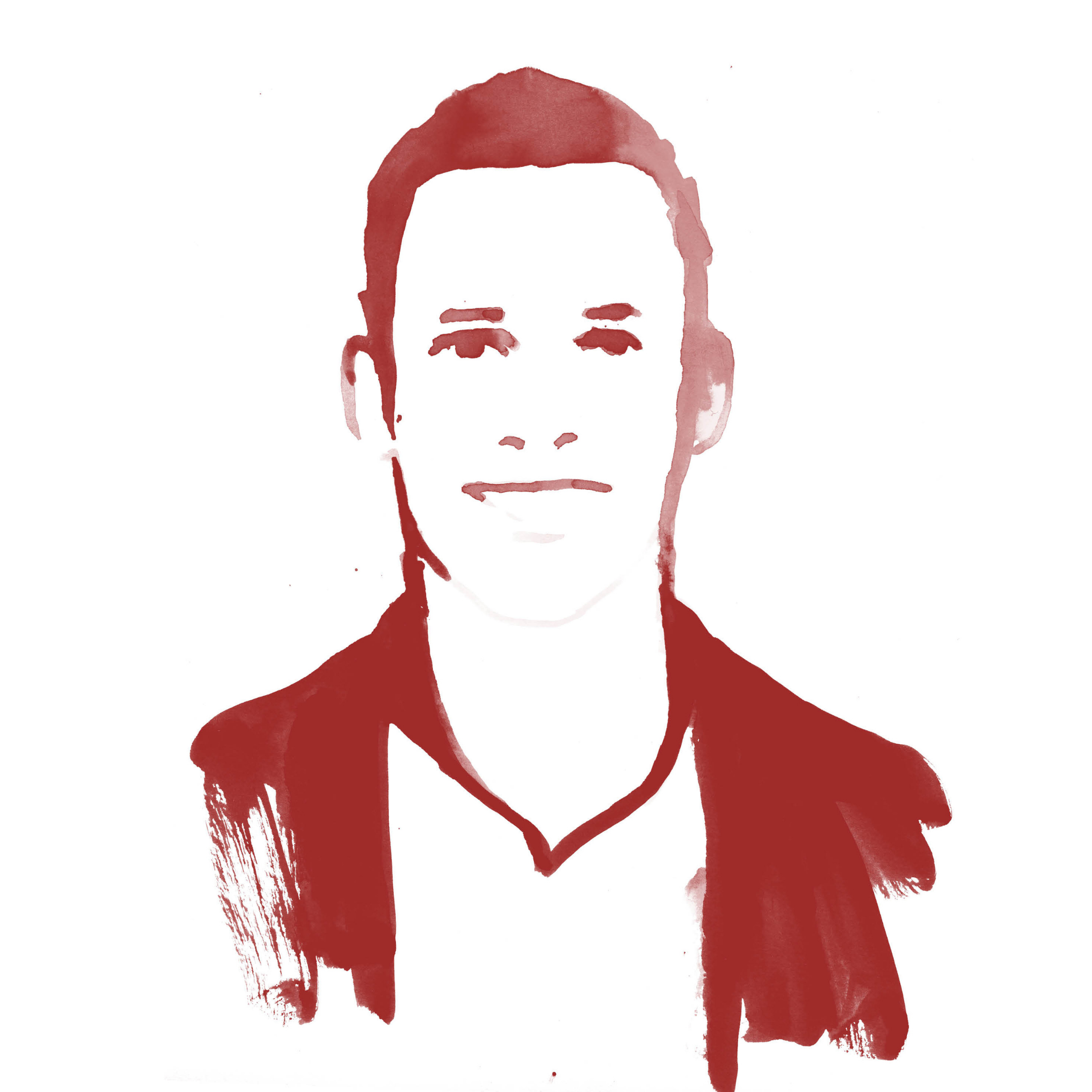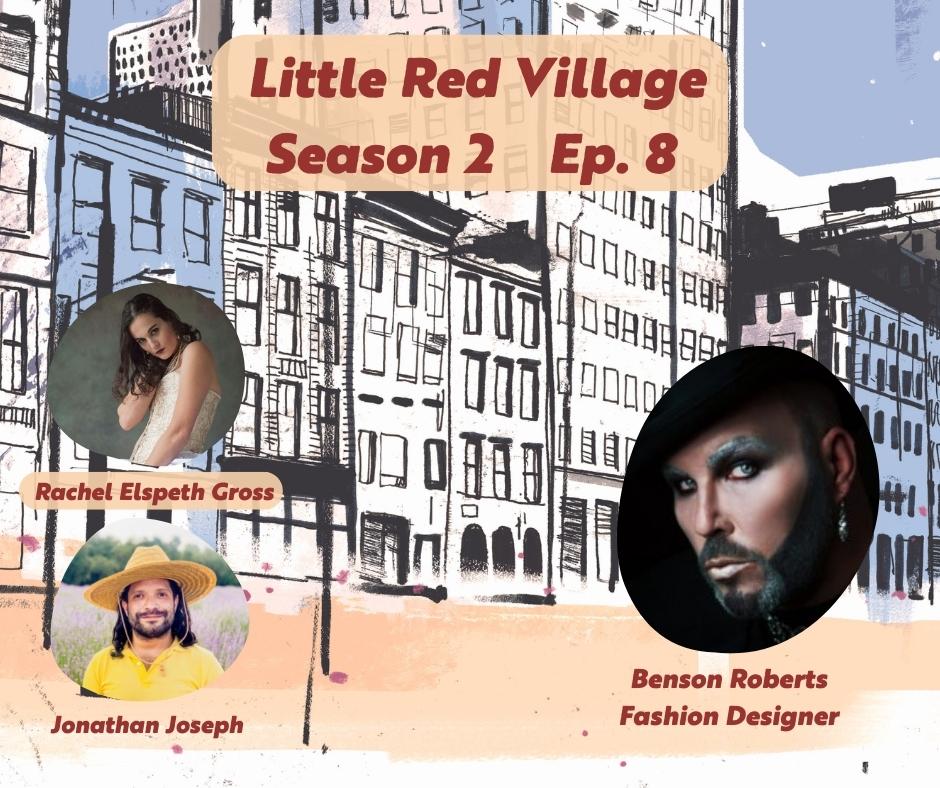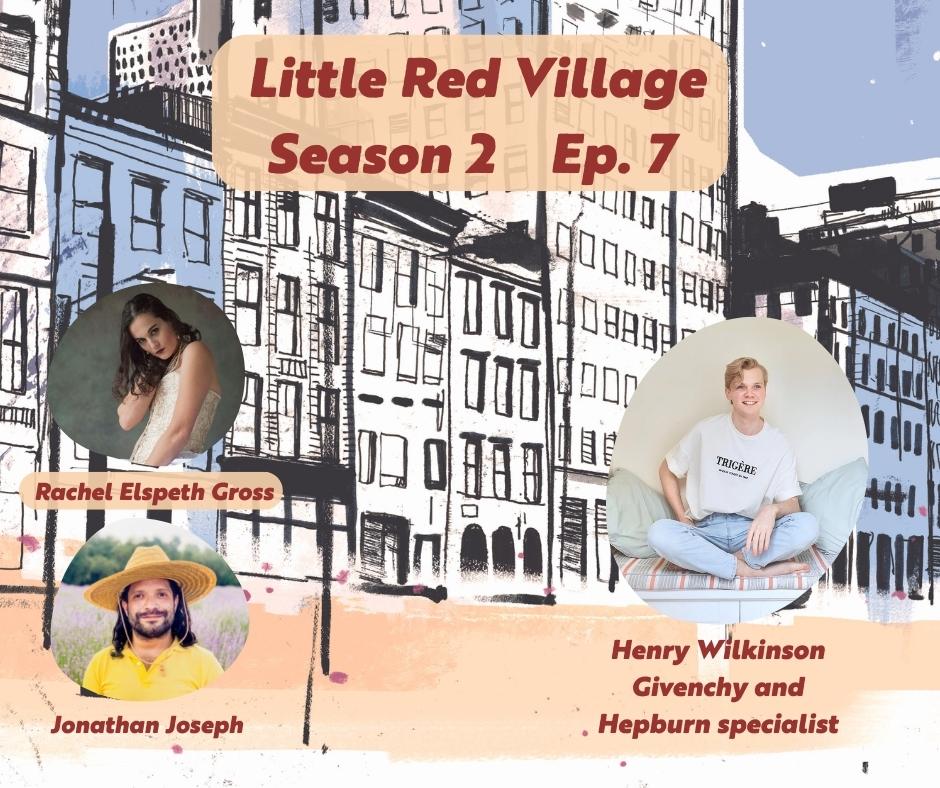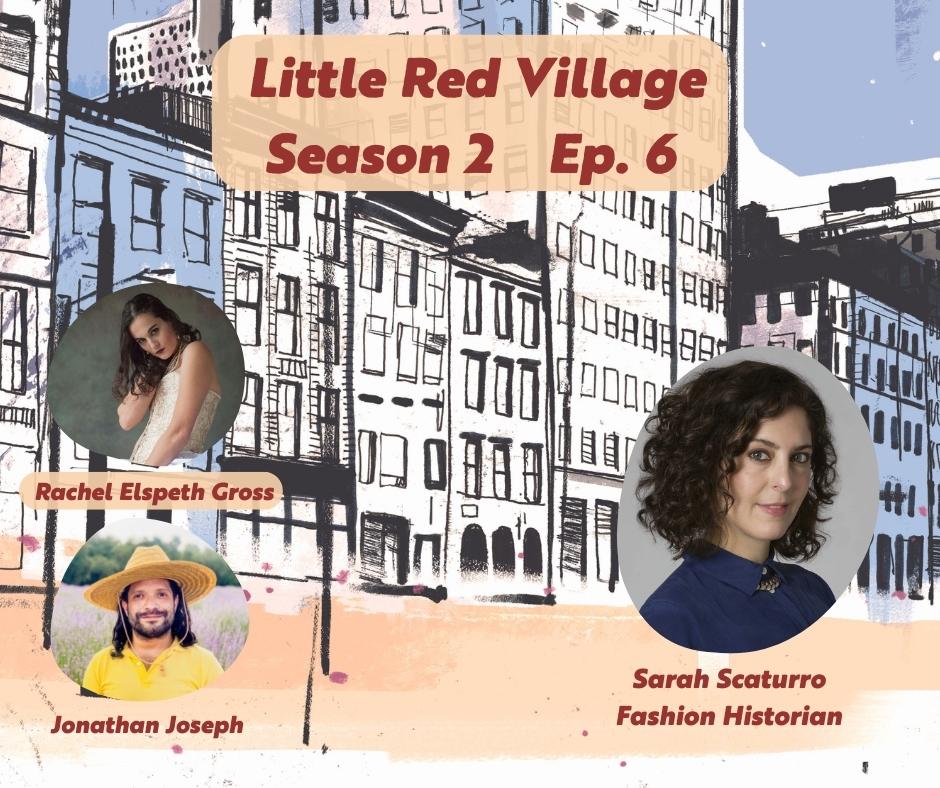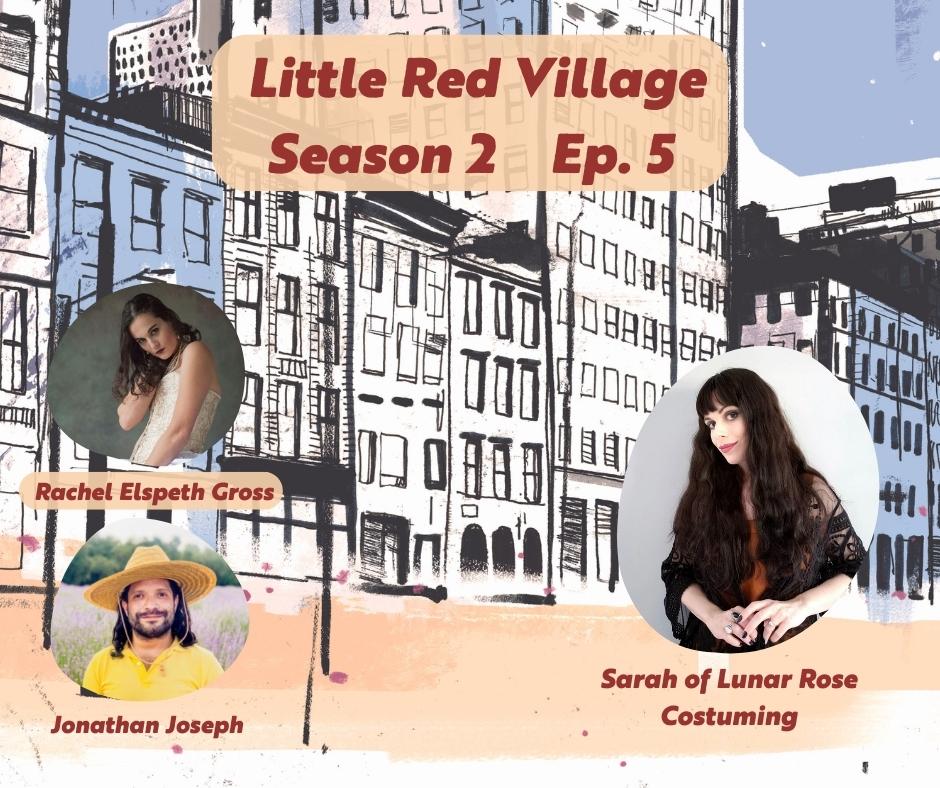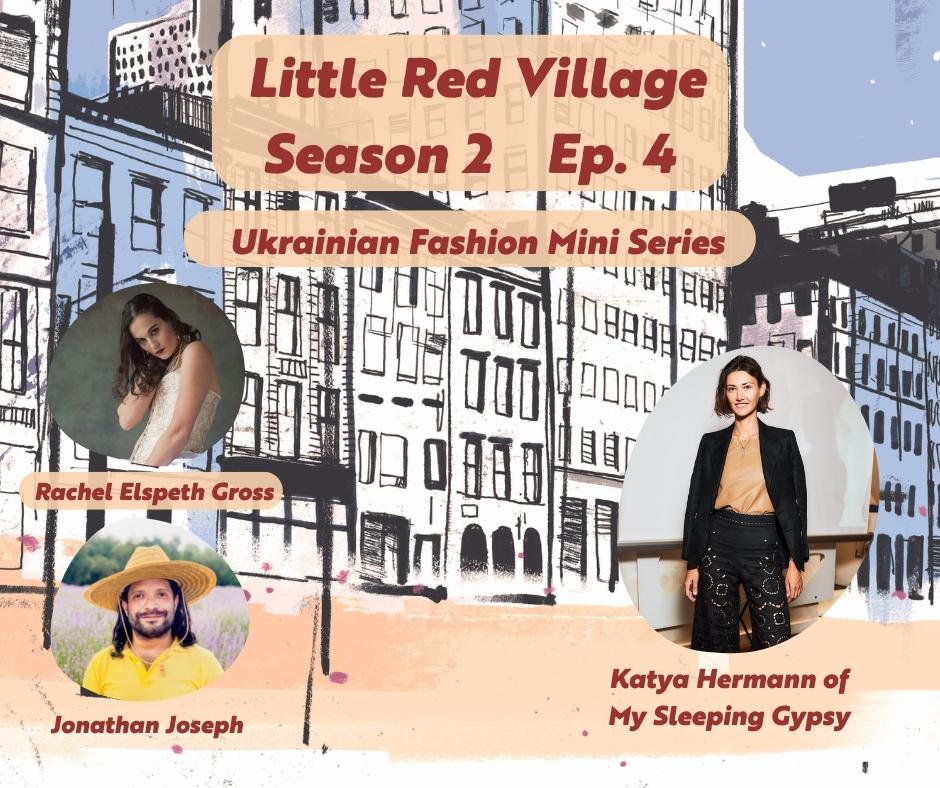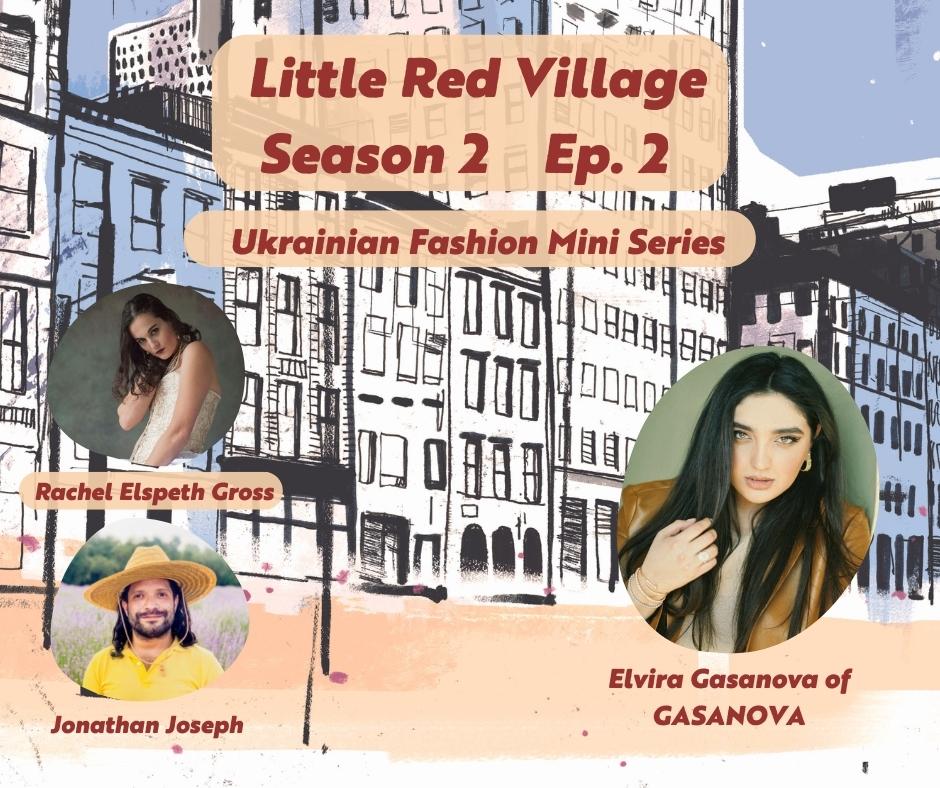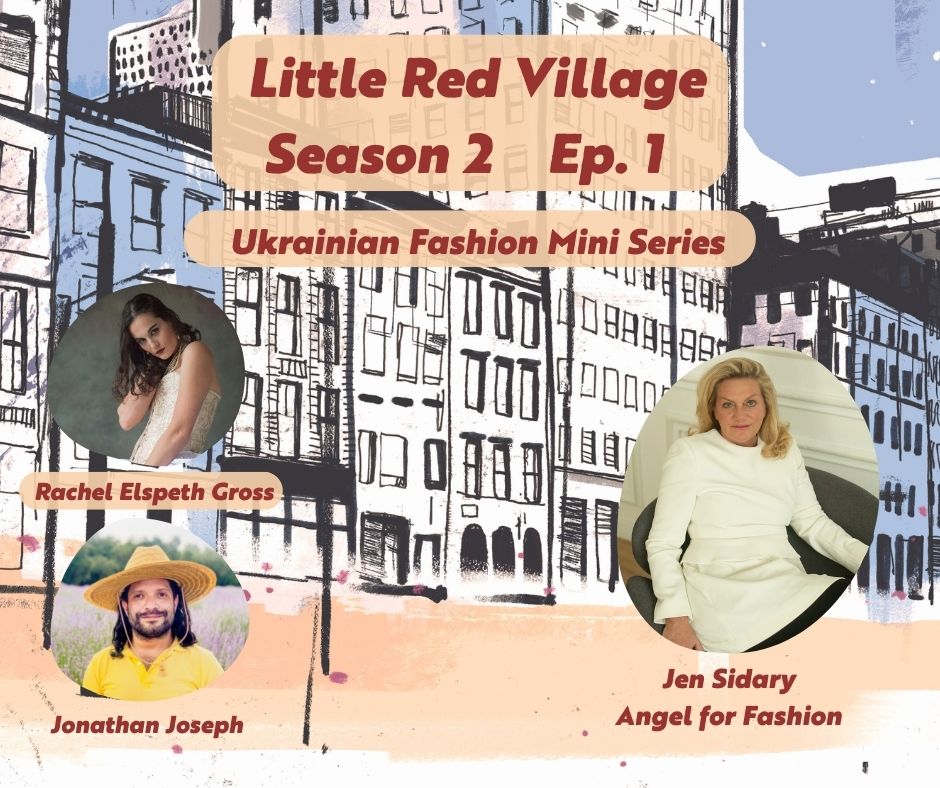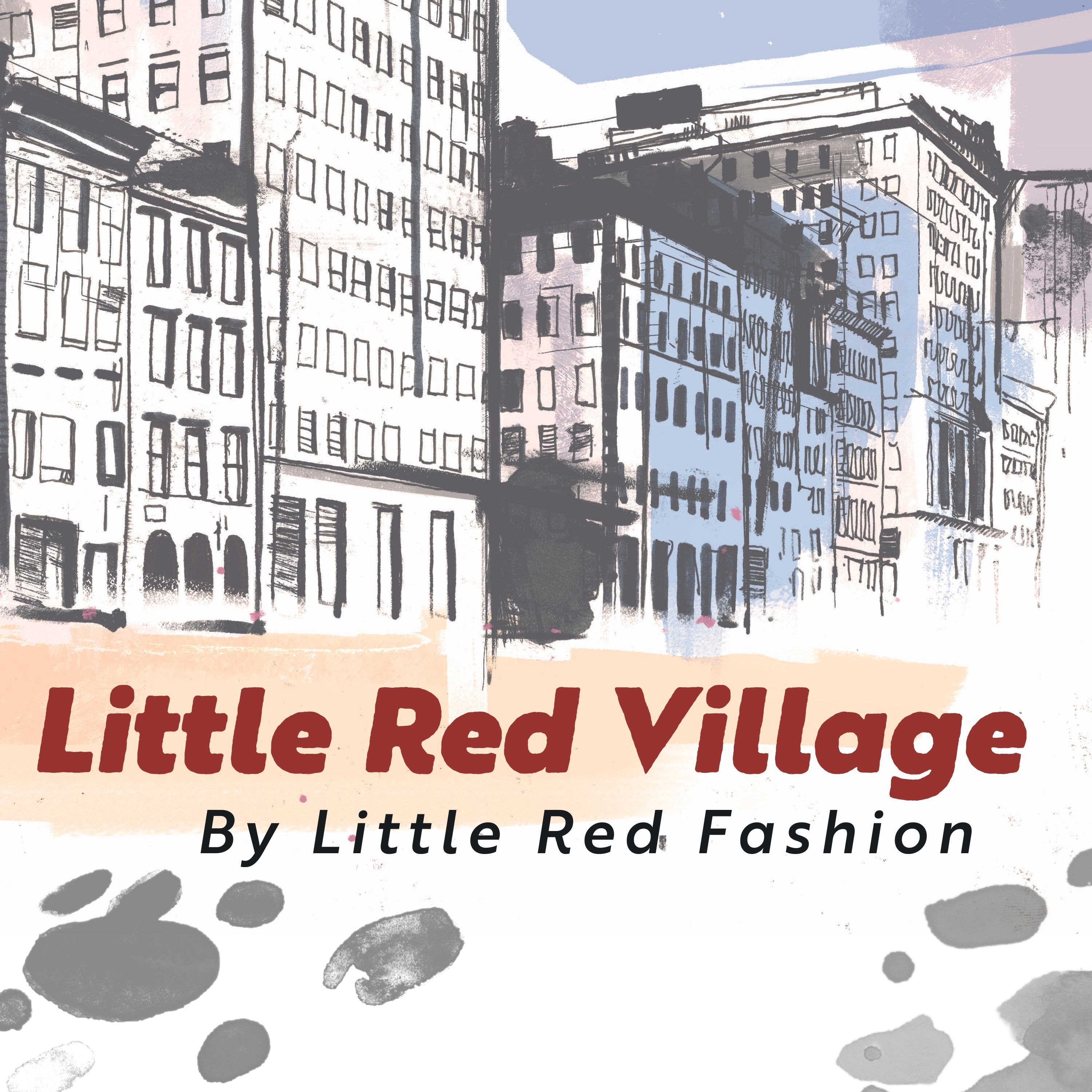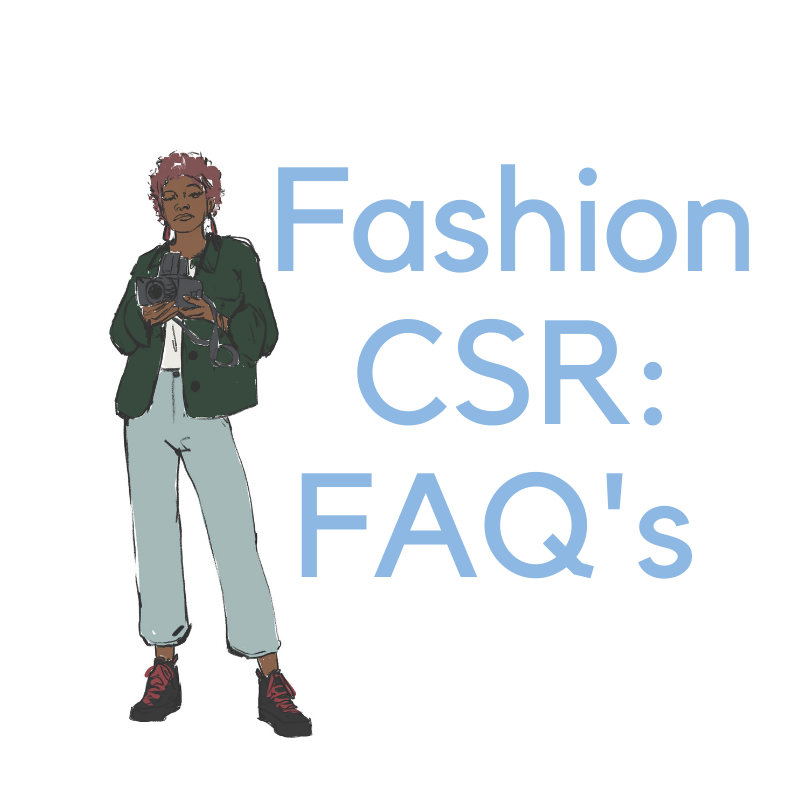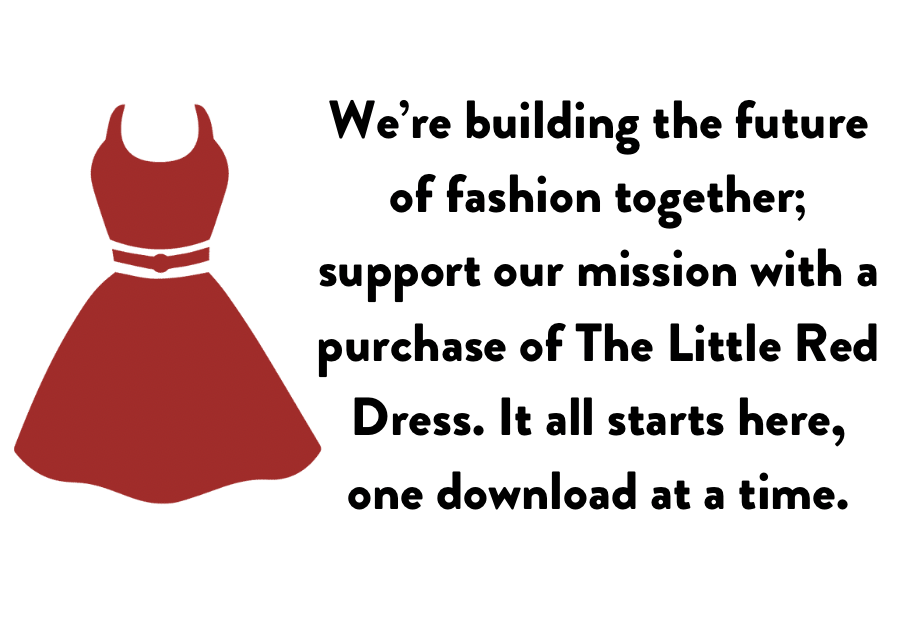Season 2 Ep. 3
Links to listen
Links to all other podcast platforms can be found here.
Speakers
Rachel Elspeth Gross (Host)
Jonathan Joseph (Host)
Kateryna Vozianova (Guest)
Rachel Elspeth Gross 00:00
What is the most perfect thing I can do? That's the question that haunted Kateryna Vozianova on over until she created INDPOSHIV which means industry a brand that produces tailored suits which meet the standards of Savile Row. When we recorded this interview in May. And I mean literally the moment that we met face to face through video chat to record, air raid sirens were going off in the distance. Kateryna says she's used to it now as are her small children. Her husband wasn't allowed to leave the country and her family made the decision to stay in Ukraine together. The day we recorded this interview, Kateryna told us there were rumors that her neighborhood will be bombed heavily the next day. That's what she's dealing with. She strives to keep her business which employs about 75 people alive. Kateryna didn't always want to work in fashion, and even now, she'll tell you that she feels more like an interpreter and a designer. Her father is well known, considered to be one of the godfathers of Ukrainian fashion. And from childhood she resisted the idea of following in his footsteps. Her career started in marketing, she worked with some pretty big brands, and learned about what it took to make a business thrive INDPOSHIV her brand does not make collections, there are bespoke tailoring house, which means that they only make made to measure tailored apparel specifically to fit the needs of their clients. Kateryna created an incredibly sustainable model that produces almost no waste. And last year, their success allowed them to start to expand into the women's wear market. Kateryna must be scared, anxious, worried, she presents none of that. She told us confidently that she is where she needs to be, which is home, Ukraine, with her family and doing the work that means the most to her. I have zero doubt that she will pass on to her children, the heritage of precision that she has worked so hard to build and to maintain. Hi, everyone, we are back. We have another incredible designer with us today. From the Ukraine. This is Kateryna from info chef and she makes some of the most beautiful bespoke men's tailoring that I've had the pleasure to look at. in quite a long time. Katarina, thank you so much for making the time to speak with us this morning. We really, really appreciate it. How are you doing? Are things are things okay?
Kateryna Vozianova 02:48
Well, actually, it's okay. But the Okay, it's a new. It's a new okay for all of us now. Yes, we are. Okay, we're getting used to everything that is happening around us. Yeah, we are okay.
Rachel Elspeth Gross 03:03
It's sad, so tragic that the new normal has to be this. And I hope so dearly that it is over soon.
Kateryna Vozianova 03:10
Yeah. We also hope that as well. But actually, judging from my point of view from inside, it's It's tragic, of course. But the main thing is to keep going on. And it's really unbelievable. But this motto that everyone has been told in us from all of this sources, all of this coaches, etc. And you need to keep going on. It works. It works. And really, it works.
Rachel Elspeth Gross 03:42
I'm thrilled, thrilled to hear that. Do you have a facility where you produce your clothing and keep Are you manufacturing?
Kateryna Vozianova 03:49
Yep. Now, actually, our brand is 13 years old. And we've started from very, very, very small facility with three persons, one of which were cutter and tailor and all of the production, actually. And he was the main guy who was responsible for tailoring suits, all of the things we've been tailored 30 years from now. And right now, yes, we are based in key of our production base in Kyiv. We are 70 Not all of us are there on the ground currently, because some of us have left to Ukraine. Some of our work is now that Ukraine, some of them are in western Ukraine, and they're not in cave, where we are based, but we are still working. We've continued our operations. We've reconfigured I would say our operations two weeks from now, and then we're working.
Rachel Elspeth Gross 04:43
That's wonderful. I know work can be a wonderful distraction, and it can be a great anxiety or stress, or so we always like to ask people this is a fun question. Do you have a memory from childhood the first time that you really loved a piece of clothing The first time you understood how much you needed to be in the world of,
Kateryna Vozianova 05:04
well, actually, I need to be very sincere in that I'm not an actual designer, I'm an organizer and chief architecture, I would say, of my business, because in my heart in my soul, I'm an entrepreneur, but not a designer. But I have my father, who is a designer of women's clothes in Ukraine, and he started when Ukraine just was born reborn, I would say, so, you know, for me, this memory from a childhood you're asking for this was when I was going to school and I was having my breakfast. And I had my father just around me was carrying a piece of dress. And it was in the kitchen. And I just realized, I'm like, eight years or nine years old. I don't remember right now. But I realized that, is this really a business? Is this really something that you can work on? And I know my father used to be an English teacher, actually, when he was Soviet Union, but when the Soviet Union was broke, he realized that he is designer. He was 20. And he started to work that way. And I saw him doing something in the kitchen. I mean, he was cutting something and tailoring something in the kitchen. And for me, this was my I guess this was my first touch was a design that and this whole thing. And actually, this touch was like, Oh, my God, I will never never do it in my life.
Kateryna Vozianova 06:48
But after I don't know how many years, I'm here, and the thing I'm doing is not as designed, but when we're talking about bespoke, it's about architecture. For me, it's about the culture of it, and the essence of it and the point of it, and the discotheque about it is the business for me businesses, a discotheque is something that I'm dancing with. For me, it's very, I don't know how to say it. It's it's very from my heart. But I'm not a designer. I'm not inventing suits, I have my perfect cutters and tailors who do it. But for me, design lies in the essence of business and the essence of the workflow.
Rachel Elspeth Gross 07:41
We've spoken with all types of people who work in fashion, it's one of the things that we hope to do is show that there are so many ways to have a career in an industry, that means something to so many of us. And I'm sitting here looking at the pictures, this could be Savile Row. I mean, it's gorgeous. It's beautiful.
Kateryna Vozianova 08:00
Actually, when I have invented the business 13 years ago, I just put myself a question, what is the perfect essence, perfect thing, the most perfect thing you can do. And they realize that the most perfect things are done at Savile Row, not in terms of like the one piece perfect, but in terms of brand. It's a perfect, it's a perfect brand. And it's it's a perfect history of what they can do. And they studied it a lot. And they realize that actually, maybe in current times, it's awkward to speak about that. But in Soviet Union, we had huge culture of individual tailoring. And when I got to think about that, and got to think about the Savile Row heritage and about our heritage, I understood that they match. And that was the point when I realized, wow, we can do business on that. And then I started.
Jonathan Joseph 09:06
I love that I think you what you described is really powerful because you identified this common thread that tied together the heritage of two seemingly disparate cultures when it comes to again Savile Row, and I love that I think that's really expansive and your whole story is really expansive. One of the things that Rachel and I are very passionate about what this podcast is making sure that any child or any young person interested in even any facet of this, whether it's building a business, seeing the moving parts come together as a vision the way you just described. That's really important to show kids and I think what I love is that you have triangulated this unique brand positioning based on that love and heritage of precision and I think it's important because a lot of young people we engage with her at Little Red Fashion often say I love clothes. But I'm not a designer, I don't draw, I don't stop or are a wonderful role model for loving fashion and meeting fashion where you're at for your skill set and passions, and then putting a team together around that to create the vision.
Kateryna Vozianova 10:27
Exactly. Because before that, I used to work at Smile lock, actually, but I used to work for Gillette. And then when that was acquired by Procter and Gamble, I used to work for Procter and Gamble in brand management. And I realized it's like in my very heart and soul and blood, the essence of the brand and the essence of what is building a business. And I was really very lucky because when I used to work for Gillette, in Ukraine was the start of the business will not let the mirror start, but two or three years from the start. And the business was growing like 30% per year. And I realized what it is to make a business in Ukraine, and what is to make a brand in Ukraine, for me that I know all my strengths and weaknesses. My weakness is that I'm not a designer, I'm not a creative person, I can't create. I know my father who is a creative person, so I can compare me to himself and I realized that I can't create out of nothing can be a doozy connection, I can see the connection in the business, and I can see how it all merges into one single, big idea. And for me, merging into big idea and developing this big idea is the mere essence of my business.
Jonathan Joseph 11:50
What you just described is very much you sound like a systems thinker, and how to create a system and have that system feed on a central brand story, which I think is really important, though, makes me want to ask you what the iterative process is like for you since you're not designing. So when you're going through a collection to decide, maybe to describe for our listeners what your particular iterative process might be, of course,
Kateryna Vozianova 12:17
but initially we are not into collections we are into bespoke so we tailor individually for every man and we have launched last year of the women's brand of bespoke wear, as well as them heroism, but initially as being me as not as designer but as a like a creator of business. For me, it was important to create something that didn't ask me to create like a masterpiece, but nevertheless we have come initially, eventually to understand that we need to do something that distinguishes our brand from all the brands not in Ukraine because we are not competing in Ukraine work and all that distinguishes us from all over the world. And I understand that that is not something that you can think of oh my god, this will be the pocket or this will be the label or this will be the handkerchief. It is something that your essence is built on and I have realized that our essence is built on that we are tailors and we are tailoring individually. And we know how to tailor for each body type perfectly. And I realized that our collection that we have the we have presented on the website or that it will be the collection that will fit perfectly on each body type because we know a lot of body types. And we know a lot of figures we know a lot of man and we know and we know how to fit them. So this is our essence and we're building on that.
Rachel Elspeth Gross 13:57
Craftsmanship seems like a great place to put Yeah, I mean.
Jonathan Joseph 14:01
Absolutely. I think these days where everyone is finally starting to question the systems of fast fashion your brand is so special because of its emphasis on slow fashion tailoring is the original slow fashion you know slow fashion is such a buzzword right now.
Kateryna Vozianova 14:21
You're absolutely right you know when when we have started 13 years ago and when this whole thing about consumerism etc was started when I said okay we have no left overs because we are ordering exact piece of clothes for each suit and we have no leftover so there is nothing we can do. So we are really eco fashion we have been and it's our essence and it's the the essence of the brand.
Rachel Elspeth Gross 14:50
It's so incredible to not only well first of all yes to be ecologically minded and sustainable, but to be able to do the math and to calculate and to understand And specifically, what you need. I mean wow!
Kateryna Vozianova 15:04
Thank you. Thank you very much for that. But actually, regarding the math, I'm not I used to be very well paid off person, the companies, but actually, when I left this companies, and when I started my own business, I realized they that I can do well off with just a little a little bit of money, because my passion was to realize myself in my business. And there were many times, and just recently, I've got to remember if, because, currently, we have no money problems. But nevertheless, I realized that there were really many times and many years that a lot of my employees were paid off much more than I did. And the same works for current time, actually. And I realized that, me, I do not need more, because for me, doing my business is like perfect realization of what I need. And of course, I would like to drink champagne, but if I drink, it's okay.
Rachel Elspeth Gross 16:16
I understand this so deeply, I think we'll as well, we find all the time when we have conversations like this with people all over the world, that when your work feels like play, and when work that is joy, I swear to God, it makes us all better human beings. And so power. Yeah,
Kateryna Vozianova 16:38
yeah, actually, you know, it's my point in this war we're having right now, I know that it's a horrible and tragic thing. But I realized that I'm not only optimist when I'm well off, I'm really an optimist. And all the time, and they realize right now that currently I see a lot of opportunities. Nevertheless, my country actually, I have made a post right now that they say that they will be bombed in a lot of cities. And it's awful to realize when you're living in a peaceful world, but in our world, it's all okay, well, we'll be going somewhere out of big cities. And I know that I'm trying to see a lot of opportunities right now. And I see that not all of the people are left, but a lot of the left, but not all of them are left. And we have so many perfect professional people who are who were forced in Ukraine, and they're out of work. And oh, my God, we have, we have been striving for them for such a long time. And now they, they're they're so close, and they need work. So it's our time.
Rachel Elspeth Gross 17:53
Can I ask a couple of questions about your work?
Kateryna Vozianova 17:56
Of course, yeah, yeah.
Rachel Elspeth Gross 17:57
I know, traditionally, within the fashion industry, a lot of like the handwork that gets done is traditionally female. Is it the same in men's tailoring? Or is it more of a male workforce?
Kateryna Vozianova 18:10
It's the same I used to think that is the same for Ukraine. It's for Soviet countries, but in this like English world, it's not the same, but it's the same all the handwork. It's more or less done by film, but all of the cotton work, the measuring things dealing with client and caring, it's a male world. And for me, initially, it was a question because I realized that Oh, my God, are we so sexist? So just actually hiring male for being the cutters. And I actually realized that yes, we are and yeah, it's traditionally it's like males and females who are so are tailoring mans are cutting, it will change and it is changing right now. But it is changing very, very slowly, because cutting, it's more of a prerogative and it's more of taking responsibility for a design for a piece of art that you're creating for, for a special client. And tailoring. It's more of a handwork. But it's very hard to handle. Of course, it's very hard. And it takes a lot of work, and especially a lot of patience. And me being in this business for 13 years, I realized that women are more patient actually. So I'm sorry to say that, but yes, tailors are mostly women.
Rachel Elspeth Gross 19:49
I understand that. It has been recommended by the government that perhaps it would be more safe for women and children to leave. And I've heard stories from Other Ukrainian designers about either their workforce choosing to stay, or finding ways to operate and other countries, how is that affecting your business,
Kateryna Vozianova 20:10
I moved to Western Ukraine and I had an opportunity, my sister is living in Brussels, and she has a free apartment where I could move to with my children. But first thing, I didn't want to go away from my husband, because he's not allowed to leave Ukraine. And secondly, I really can't imagine how I can operate my business, how I can say to all my people, that, guys, we're still working. It's all good. When I'm not in Ukraine, although 15% of my personnel have left, I realized that I merely can't do so. And the most important, I do not want move so. It's not that I'm given up. No, no, I don't want to do so I moved to Western Ukraine for two months. And every day, I was thinking about my bathroom, about my wardrobe about my living room, I was thinking about that. And when it came back, actually, I was the happiest person despite the fact that the next day, a few blocks away from me, the there was a bombing. And my children, two of them heard that. But I was the happiest person. And I realized that probably is that the person that actually in exactly in exact place that I need to be. Well, I don't know how to say it, but I am where I need to be.
Rachel Elspeth Gross 21:41
No that makes a lot of sense. I have a daughter myself. I'm so sorry.
21:46
It's my power. It's my, it's my power. It's my everything. I can't do powerful things when I'm away. I know a lot of sources who can and I admire, really, I admire them, but I can't.
Rachel Elspeth Gross 22:01
No, I can understand how rooting yourself being where you belong being home.
Kateryna Vozianova 22:07
Exactly, exactly. It's I actually before that, I didn't realize how amazing and how powerful that is.
Rachel Elspeth Gross 22:17
I have a five year old daughter, and I'm so sorry that your children have to experience but
Kateryna Vozianova 22:23
well, actually, you know, you know, they have experienced it. My oldest daughter is six years old. And my younger son, he's two. He was two years old, two months ago when we have left in March, and they have all pursued it as an adventure. And for me, that was like, wow, if they are perceiving this whole thing as an adventure them, how can I be so not worth putting them into a position. Like, oh, we are lost? Oh, oh, this horrible things happening? No, of course not. For me, the whole thing that is happening. I like bravery. I admire bravery. And when I see them, I realized that, okay, it will be great for them not to experience that. But if they haven't already done that. Great, great, they will be more brave.
Rachel Elspeth Gross 23:15
They sound magical, like magical beings. Do you think that you will teach them to sew?
23:20
Actually, I think that teaching is by experience. And well, I had this hesitation this all things happen. We had a nanny with us was sleeping with younger son, I mean flipping. She was actually being with him in the room. And when the whole things happened, I realized that we are all going somewhere. I didn't realize where but we're gonna go somewhere. And she was with him since his since he was born. And she was with him. She was my older daughter, since she was one month. So we have been with her for six years. But when she realized that we were not longer able for paying her the salary that we put used to be for the work she has left. Actually, this was the most horrible time for me during this, it's, it's I know, it's very, very not brave to say that. But when she left, I realized that I'm not only with my work that I need to bring on and do something with my 74 people but I have also to my children and I need to work with them as well and she has left at that time I realized that that there is nothing that person can't do. Really there is nothing. And when you're put in the situation, well, you're either struggling and struggling for your deferral and that's what I'm struggling for. I'm struggling for money before life or you're just saying okay, it's okay for me to be like that. Not it's not my fault. It's not my case. I'm struggling for my before life and No, that's okay. My business is very small. It's like 74 people is like 2000 clients in Ukraine. But if everyone feels the same in Ukraine, and they're struggling for there's life, we will win. Because for me struggling for a minute before life is essential. For me, it's really essential. I adore my before life, I loved my before life. I loved drinking champagne. I loved going into parties, I loved going to vacations into the most amazing places I could imagine. I loved it. And I wanted to come back. So actually, that is the thing I'm struggling for. And they think I'm struggling for my clients, and for my personal as well, because I know that there are some of them, who have come from Donetsk region that was bombed, actually, eight years ago, they had this same situation eight years ago. And I want them to have an amazing life, and amazing amount of money in an amazing work. I want them to have amazing. So that is what we're struggling for. And actually, no one no one, no one can say that. You know, you have another country you have Russia, is your new homeland? No, of course not. It's not, you know, for me, it's a struggle for essentialism. So we are all struggling for that.
Rachel Elspeth Gross 26:37
I think that I hope you know that much of the world is on your side that we believe firmly, you pray it will be glorious and independent.
Kateryna Vozianova 26:51
I know you know, for me, actually, you know that there is a such a notion that you can't say for sure, which is good, and which is bad. But for me now, I think that you know that there is some kind of have a bath, and you come into an to a point when you need to say for sure. It's no longer a choice of you want, or you won't, you need to say for sure, which is good, and which is bad. And off course I understand that there's a lot of information, informational war, etc, etc. But in the essence of your heart, you understand what is good and what's bad. And for actually, for me, this is a word of essentialism. What is good and what is bad, when you have a freedom is good. When you don't have it, it's bad. For me this obvious, and right now I'm thinking about this world, of course, me being in this world, etc, etc. It's very hard. But I realize that right now the example of Ukraine, it's like an it's like an example of really, that what is good and what's bad for all the world. And it's hard to be in this situation. But actually, we didn't have any other choice. And the second that actually needed to be done. It needed to be done because the world was so politically politically how to say.
Rachel Elspeth Gross 28:27
Divided.
Kateryna Vozianova 28:28
Yeah, I got in this, I asked myself a question, you can always ask yourself, there can be two sides, when you thinking about one problem, they're given two sides, of course, there can be two sides. But you need to have to stand on one side, eventually. And for me, that is the essential point. And right now I think that's the point for all the world.
Rachel Elspeth Gross 28:52
Yeah, we are definitely at a place I agree with you. I feel like there's an energy things are changing. And watching the bravery that I've seen in your country and your industry. It's so horrible the things that are happening and seeing people like you have seen people like you insist upon optimism, I know that the best way to get through this is to do the work you love the most. I mean, that touches my heart. It's such a real way. It's beautiful. And it's why I know for a fact that you are going to win.
Kateryna Vozianova 29:27
Thank you. Thank you.
Jonathan Joseph 29:29
Absolutely. I think one of the most important lessons we try to teach a Little Red Fashion for young creative kids and their grown ups is resilience and there's no better demonstration of resilience through fashion than the work that you're doing that Jen is doing that so many of the amazing Ukrainian designers we've been privileged enough to talk to during these crazy challenging and scary times really is so inspirational, not just for our listeners, but also for myself and for Rachel and for Ryan and for everyone on the team here at Little Red Fashion because it is Send a 10 out of out of five, you know, it's just so such a pure expression of the type of creative tenacity that is so important for all kids to learn and develop and see in action. And you doing this work in this way, and being so kind as to share that with us and our audience is really powerful. And that we hope that with this series of episodes that you're a part of, we can shed light not only on the powerful spirit of the Ukrainian people, the resilience of the Ukrainian fashion industry, but also just show kids that even in the most dire of circumstances, that creative spark will grow into a raging fire, and then sometimes it'll go back down to a small flame and then go back up. And but it never goes out.
Kateryna Vozianova 30:51
Exactly, exactly. You're absolutely right.
Rachel Elspeth Gross 30:54
Thank you so much for making the time. I can't tell you how much we appreciate this. A really,
Kateryna Vozianova 30:58
thank you very much it. It's a great pleasure to talk with you to meet with you. And really, it's an amazing time for for us all it will end soon. I hope, it's an amazing time. It's an amazing capture of the time, we'll remember it all.
Rachel Elspeth Gross 31:16
Please let us know if there's anything we can do to help. You may want to know you're safe and that you're okay.
Kateryna Vozianova 31:22
Okay, thank you very much. Thank you.
Jonathan Joseph 31:25
Thank you to all of our listeners and followers. I'm Jonathan Joseph, with my partner in crime Rachel Elspeth gross and our amazing guest today. I mean it. Thank you so much for joining us.
Kateryna Vozianova 31:37
Thank you. Thank you, guys. Thank you. Bye. Bye.
